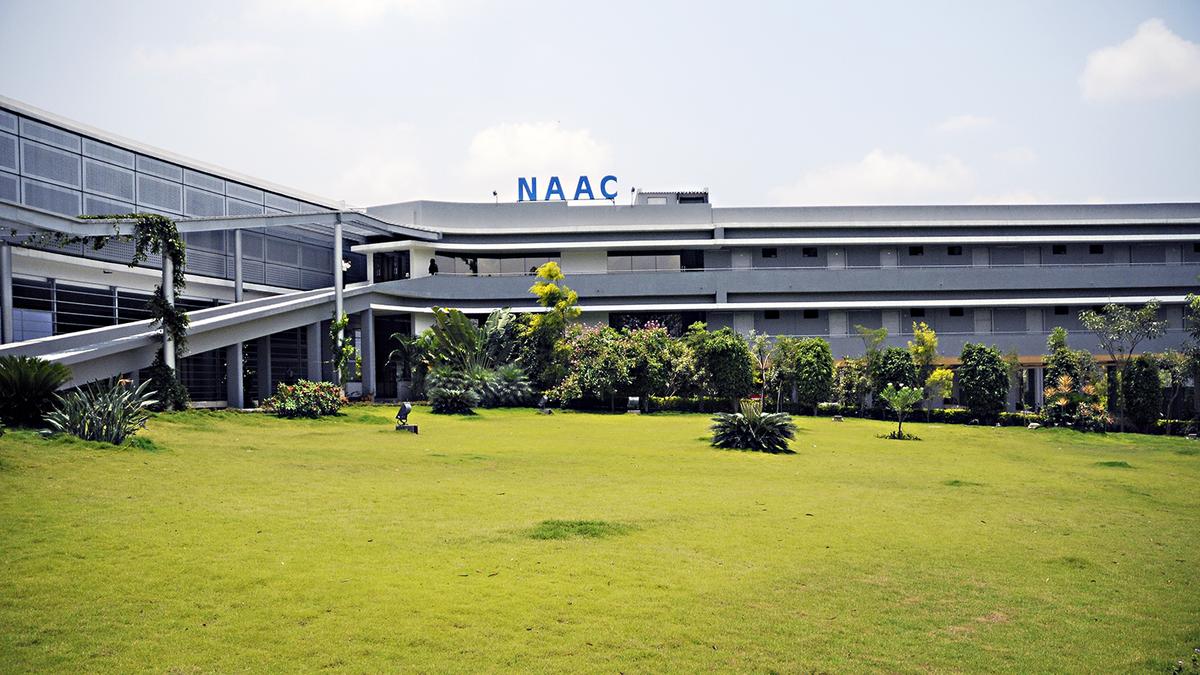A view of National Assessment and Accreditation Council (NAAC) campus. Photo used for representation purpose only
| Photo Credit: The Hindu
The scandal involving Koneru Lakshmaiah Education Foundation (KLEF) in Andhra Pradesh, as part of which bribes were offered to the National Assessment and Accreditation Council (NAAC) for favourable ranking has prompted significant changes in the grading agency.
The NAAC plans to phase out the practice of physical data verification by expert panels, based on the recommendations of the Radhakrishnan Committee’s report submitted last year.
In Andhra Pradesh, where the bribery scam surfaced, stakeholders admit to a ‘pervasive culture of offering gifts’ to the inspecting teams of the accrediting body.
NAAC team members and the institutions of higher education bypass rules, with the ‘above-normal hospitality’ being offered that includes organising special events, arranging sightseeing and most importantly, offering gifts to the inspection teams for favourable ranking.
“It has become a necessary evil and everybody is forced to entertain this for fear of losing out in the rank race,” admits a former office-bearer of Andhra Pradesh Private Engineering Colleges Managements’ Association. He says only the scale of favours varies from institution to institution.
Some members of the association feel that the KLEF turned the customary gift-giving, usually considered as a goodwill gesture, into a tool for corruption. However, regardless of the scale of the violation of rules, it is established that offering gifts with an intent to influence decisions and gain advantages is a common practice.
The bribery incident has tarnished the image of the NAAC, as those arrested in the case are the top brass of the KLEF and members of the accrediting body, including a professor from Jawaharlal Nehru University, New Delhi.
“The NAAC scam unearthed at KL Deemed to be university underscores the critical need for educational institutions to uphold ethical practices and for accrediting bodies to enforce rigorous oversight to preserve the integrity of academic standards,” says K.V.K. Rao, general secretary of All-India Federation of Self-Financing Technical Institutions.
Similar to the NAAC inspection of KL University, most regulatory body inspections often become formalities, with manipulated outcomes influenced by external factors, he says.
Mr. Rao has lodged several complaints with the Central and State governments, statutory, regulatory and investigating bodies, drawing their attention to regulatory violations and lack of oversight in granting higher status to educational institutions without compliance with norms.
Despite significant deficiencies in faculty and infrastructural facilities, as highlighted in the Government of India Gazette Notification (No. 9-48/2005-U.3, dated 27-07-2023), an institution claims to be ‘ranked around 25 in the university category’ and ‘ranked close to 85 in the engineering category” under the National Institutional Ranking Framework (NIRF)-Indian Rankings 2023.
“It raises serious concerns about the credibility and integrity of the NIRF Rankings, which are considered a benchmark for quality assessment,” he says.
Citing examples of two more institutions which have been given private university status, he says the institutions do not have land, buildings or adequate infrastructural facilities.
“One of it operates from a now-closed rental building of just 30,000 sft, but it continues to exist solely on paper and remains listed among approved private universities maintained by the UGC,” he says.
Raising concern over what he calls gross violations of statutory norms in granting of private university status, deemed to be university status, accreditation and autonomous status by various regulatory bodies, he says it has resulted in commercialisation of education and severe detriment to small affiliated colleges.
Published – February 28, 2025 10:23 am IST
